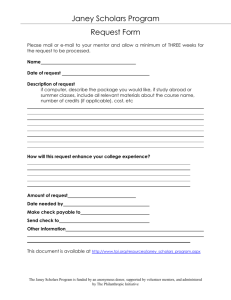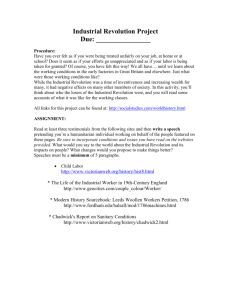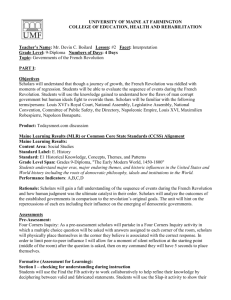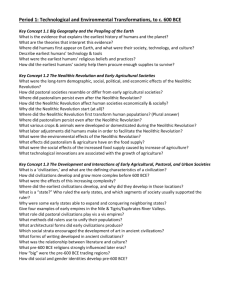A P WORLD HISTORY COURSE SYLLABUS 2014
advertisement
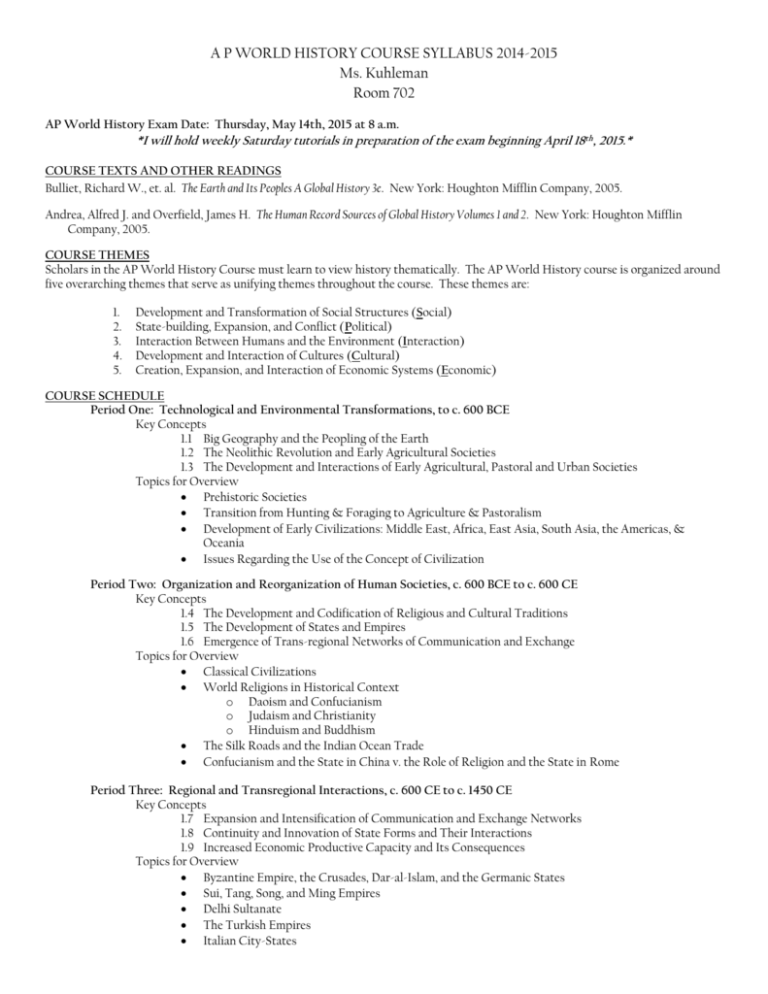
A P WORLD HISTORY COURSE SYLLABUS 2014-2015 Ms. Kuhleman Room 702 AP World History Exam Date: Thursday, May 14th, 2015 at 8 a.m. *I will hold weekly Saturday tutorials in preparation of the exam beginning April 18th, 2015.* COURSE TEXTS AND OTHER READINGS Bulliet, Richard W., et. al. The Earth and Its Peoples A Global History 3e. New York: Houghton Mifflin Company, 2005. Andrea, Alfred J. and Overfield, James H. The Human Record Sources of Global History Volumes 1 and 2. New York: Houghton Mifflin Company, 2005. COURSE THEMES Scholars in the AP World History Course must learn to view history thematically. The AP World History course is organized around five overarching themes that serve as unifying themes throughout the course. These themes are: 1. 2. 3. 4. 5. Development and Transformation of Social Structures (Social) State-building, Expansion, and Conflict (Political) Interaction Between Humans and the Environment (Interaction) Development and Interaction of Cultures (Cultural) Creation, Expansion, and Interaction of Economic Systems (Economic) COURSE SCHEDULE Period One: Technological and Environmental Transformations, to c. 600 BCE Key Concepts 1.1 Big Geography and the Peopling of the Earth 1.2 The Neolithic Revolution and Early Agricultural Societies 1.3 The Development and Interactions of Early Agricultural, Pastoral and Urban Societies Topics for Overview Prehistoric Societies Transition from Hunting & Foraging to Agriculture & Pastoralism Development of Early Civilizations: Middle East, Africa, East Asia, South Asia, the Americas, & Oceania Issues Regarding the Use of the Concept of Civilization Period Two: Organization and Reorganization of Human Societies, c. 600 BCE to c. 600 CE Key Concepts 1.4 The Development and Codification of Religious and Cultural Traditions 1.5 The Development of States and Empires 1.6 Emergence of Trans-regional Networks of Communication and Exchange Topics for Overview Classical Civilizations World Religions in Historical Context o Daoism and Confucianism o Judaism and Christianity o Hinduism and Buddhism The Silk Roads and the Indian Ocean Trade Confucianism and the State in China v. the Role of Religion and the State in Rome Period Three: Regional and Transregional Interactions, c. 600 CE to c. 1450 CE Key Concepts 1.7 Expansion and Intensification of Communication and Exchange Networks 1.8 Continuity and Innovation of State Forms and Their Interactions 1.9 Increased Economic Productive Capacity and Its Consequences Topics for Overview Byzantine Empire, the Crusades, Dar-al-Islam, and the Germanic States Sui, Tang, Song, and Ming Empires Delhi Sultanate The Turkish Empires Italian City-States Kingdoms and Empires in Africa The Mongol Khanates Trading Networks in the Post-Classical World Islam and Its Spread Bantu and Polynesian Migrations Empires in the Americas: Aztec and Inca The Indian Ocean Trading System (with a particular emphasis on the Swahili City-States) The Growth and Role of Entrepôt Cities in the Post-Classical World Period Four: Global Interactions, c. 1450 to c. 1750 Key Concepts 1.10 Globalizing Networks of Communication and Exchange 1.11 New Forms of Social Organization and Modes of Production 1.12 State Consolidation and Imperial Expansion Topics for Overview Ming and Qing Rule in China Japanese Shogunates The Trading Networks of the Indian Ocean Effects of the Continued Spread of Belief Systems Three Islamic Empires: Ottoman, Safavid, and Mughal The Columbian Exchange and the Colonization of the Americas The Trans-Atlantic Slave Trade Construction of Race in Colonial America Changes in Western Europe – roots of “The Rise of the West” Period Five: Industrialization and Global Integration, c. 1750 to c. 1900 Key Concepts 1.13 Industrialization and Global Capitalism 1.14 Imperialism and Nation-State Formation 1.15 Nationalism, Revolution, and Reform 1.16 Global Migration Topics for Overview The Age of Revolutions: American Revolution, French Revolution, Haitian Revolution, and Latin American Independence Movements Global Transformations: End of the Atlantic Slave Trade, Industrial Revolution and Its Impact, Rise of Nationalism, Imperialism and Its Impact on the World Comparison of the French Revolution and the Latin American Wars of Independence Changes in Methods of Production in Europe and Its Impact on the World Decline of Imperial China and Rise of Imperial Japan 19th Century Imperialism in Sub-Saharan Africa, South Asia, and Southeast Asia Period Six: Accelerating Global Change and Realignments, c. 1900 to the Present Key Concepts 1.17 Science and the Environment 1.18 Global Conflicts and Their Consequences 1.19 New Conceptualizations of Global Economy, Society, and Culture Topics for Overview Crisis and Conflict in the Early 20th Century: Anti-Imperialism Movements, World War I, Russian Revolution, Mexican Revolution, Chinese Revolutions, Great Depression, Rise of Militaristic & Fascist Societies, World War II Internationalization: Decolonization, the Cold War, International Organizations, the Post-Cold War World, Globalization World War I and World War II: Global Causes and Consequences Causes and Consequences of the Great Depression Development of Communism in Russia and China Responses to Western Involvement in Sub-Saharan Africa and Latin America Exam review will commence one month prior to the test date. AP World History Classroom Policies and Course Requirements Grading: Scholars will be assessed according to the school’s grading policy—30% major assignments, 40% class work, 15% homework, and 15 % quizzes. Major assignments include essays, projects, and exams. Homework: Scholars should expect nightly homework, consisting of reading and note-taking from the textbook or other assigned documents. *Scholars will receive a calendar with weekly readings at the beginning of each six week cycle.* Classwork: Classwork will include but is not limited to completion of maps and charts, discussion and debate, practice POV statements and essay writing techniques, simulations, and note taking, both from lecture and from occasional videos. Quizzes: Scholars will have weekly reading quizzes (open note) to assess their homework reading. Quizzes will be timed. Exams: Exams will be modeled on the AP exam, including both multiple choice questions and timed essays. Exams will be timed. Essays: Scholars will be thoroughly instructed on the three (3) essays required on the AP World History Exam—the Document Based Question (DBQ), the Comparison/Contrast Essay, and the Continuity and Change Over Time Essay. Scholars will complete a minimum of two essays per each six week cycle. *Scholars whose previous writing experience has not prepared them for analytical writing should expect to spend time in tutorials.* Behavior: Scholars will be expected to adhere to the student code of conduct. It is especially important for AP students to come to class with all needed supplies and completed assignments. Due to the pace of the class, it is critically important that scholars are present daily and do not fall behind on either their reading or their coursework. Scholars are expected to adhere to the Student Code of Conduct at all times. Classroom disruptions will be dealt with according to the guidelines as outlined in the Student Code of Conduct. Contact Information: jkuhlema@houstonisd.org Tutorials: Tuesdays or by appointment. I’m here for you, just ask! 4:00 – 5:00 pm *I will hold weekly Saturday tutorials in preparation of the AP Exam beginning April 18th, 2015. A reminder will be sent at a later date.* Supplies: Blue or Black Pen Three Ring Binder with 6 Dividers College Ruled Paper



